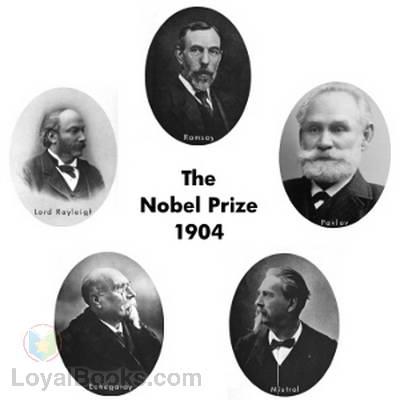
By: Various
"The Nobel Prize in 1904" is a collection of works by various authors who were awarded the prestigious Nobel Prize in that year. Each piece showcases the incredible talent and innovation of its respective writer, covering a wide range of genres and topics.
The anthology is a fascinating glimpse into the literary world of the early 20th century, with each author bringing their own unique voice and perspective to the table. From thought-provoking essays to captivating short stories, this collection offers something for every reader.
While some pieces may resonate more strongly with certain readers than others, the overall quality of writing is consistently high throughout the book. It's clear why each author was deemed worthy of receiving the Nobel Prize, and their work continues to stand the test of time.
Overall, "The Nobel Prize in 1904" is a captivating and thought-provoking read that highlights the best of the best in literature from that era. Whether you're a fan of classic literature or simply appreciate well-crafted storytelling, this anthology is sure to entertain and inspire. Book Description:
The Nobel Prizes are international awards bestowed once a year by Scandinavian committees for cultural and scientific advances. They were established in 1895 by the Swedish chemist Alfred Nobel, the inventor of dynamite. The prizes in Physics, Chemistry, Physiology or Medicine, Literature, and Peace were first awarded in 1901.
The Laureats of 1904 were:
Physics: Lord Rayleigh (John William Strutt, 1842 - 1919), "for his investigations of the densities of the most important gases and for his discovery of argon in connection with these studies";
Chemistry: Sir William Ramsay (1852 - 1916), "for his discovery of the inert gaseous elements in air, and his determination of their place in the periodic system";
Physiology or Medicine: Ivan Petrovich Pawlow (1849 - 1936), "in recognition of his work on the physiology of digestion, through which knowledge on vital aspects of the subject has been transformed and enlarged";
Literature: Frédéric Mistral (1830 - 1914) (one half), "in recognition of the fresh originality and true inspiration of his poetic production, which faithfully reflects the natural scenery and native spirit of his people, and, in addition, his significant work as a Provençal philologist",
and José Echegaray y Eizaguirre (1832 - 1916) (one half), "in recognition of the numerous and brilliant compositions which, in an individual and original manner, have revived the great traditions of the Spanish drama";
Peace: L'Institut de droit international (Institute of International Law), "for its efforts as an unofficial body to formulate the general principles of the science of international law.".
This multilingual collection (in French, English, German, and Spanish) contains the presentation speeches for the Laureats, their biographies, as well as the famous "Nobel lectures" for the three scientific awards.
|